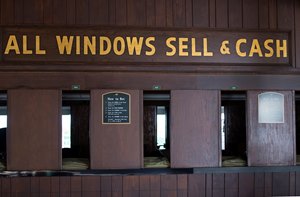Regulators Urged to Make Room for Betting Innovation


After observing growth in race-wagering forms that are not available to U.S. players, experts urged regulators April 6 to find ways to allow more innovation in betting to open the door for things like fixed-odds wagering, in-race wagering, betting markets, and beyond.
The panel titled "Behind the Curtain: Technology and Change in a Growing Industry" spoke on the final day of the Association of Racing Commissioners International conference on equine welfare and racing integrity in Hot Springs, Ark.
Sean Pinsonneault, a consultant and former executive with Woodbine Entertainment Group, said regulators should find ways to partner with industry, research other markets, consider ways to be better equipped to handle innovation, and—most importantly—start now.
J. Curtis Linnell, executive vice president of the Thoroughbred Racing Protective Bureau, which oversees wagering pools for the tracks, noted reasons for that urgency. He said that while pari-mutuel wagering in North America has declined about 25% since 2007—despite a recent uptick—sports betting in Nevada has improved 88%. He said wagering on horse racing in Australia is up 38% during the same years.
Linnell said a big part of the growth in Nevada has been the addition of in-game betting that allows players to wager not just on the final outcome but from half to half, quarter to quarter, and even play to play. He noted the growth in race wagering in Australia has occurred at a time in which its handle has shifted from 70% pari-mutuel and 30% fixed-odds to 62% fixed-odds wagering and 38% pari-mutuel.
In fixed-odds wagering, bettors have the ability to lock in odds—say, 3-1 on a horse to win—with no chance of those odds changing after the wager is made.
Pinsonneault said it's important to see opportunities in new ideas, even ones that may not directly benefit the industry. He outlined the success of Colossus Bets in the United Kingdom in increasing interest in horse racing.
The company allows players to buy and sell live multi-race wager tickets or a percentage of those tickets.
While the U.K. system is not set up to directly pay horse racing when one player sells a part of a ticket to another, Pinsonneault said studies have shown it has increased engagement and that players typically take the money and bet it back into pools. He said it also creates excitement on social media as bettors talk about deals they have cut.
"It creates a game within the game," Pinsonneault said. "It's really created a lot of excitement in the sports betting world in the U.K."
Linnell noted that Colossus Bets is using technology to facilitate transactions that have occurred forever in the racing environment, comparing it to a player at a racetrack who hits a longshot in the first half of a daily double and then looks for partners to buy in to the potential of the proposition.
Pinsonneault said innovators need to be able to see how their product can be put in place within 18 months. He said a longer time frame might force the innovator into another area.
Linnell said the fixed-odds market in Australia sends a lower return to racing than pari-mutuel wagering, but its growth has been substantial enough to help double prize money (purses) in the past 10 years.
The stakes are high. Linnell said bettors who are not finding the wagering options they want in legal pari-mutuel pools are betting at offshore outlets that do not return money to racing.
"It's a lot of money," Linnell said. "It's a lot of money, in a lot of cases, being wagered on bet types that we're not offering today. The fixed-odds market is huge. The in-running market for illegal betting exchanges is massive. We don't offer those bets; we don't have a regulatory environment that accepts that. That is a massive amount of money being bet at other operators that is not going back to benefit the industry."
The panel hit home with ARCI president Ed Martin, who encouraged regulators to use the wave of new sports betting legislation arriving in states to provide options for horse racing.
"I think it's incumbent on every racing commission to have your general counsel look at any bills going through the legislature to make sure that they are broad enough," Martin said. "You may want to give some serious thought into slipping something into a bill in the legislature that will give you maximum flexibility."
Martin said the entire industry needs to welcome this type of innovation.
"It's not only the racing commission's responsibility, it's the responsibility of the horsemen, the tracks, the breed registry, and everybody involved in the sport. This sport is in a highly competitive environment. We can be sitting here talking about pari-mutuel wagering 10 years from now, but you just saw these statistics about fixed-odds wagering and where the market is taking wagering. Bets are going offshore because we cannot offer these opportunities domestically. ... We have not collectively as an industry done what we need to do to adapt to the technology coming forward. This is about the survival and competitive position of an industry.
"We can debate Lasix for five more years, but if we don't focus on this side, we'll be debating Lasix in front of an empty grandstand."
Linnell said the number of regulators in the U.S. could be a strength as states may be able to experiment with some of these new ideas.
"We're going to find a jurisdiction in North America that's innovative and wants to challenge the status quo," Linnell said. "It's just a matter of time, and hopefully we see it sooner rather than later so we can bring some of these innovations to the customer into horse racing and actually get money back to the participants."
